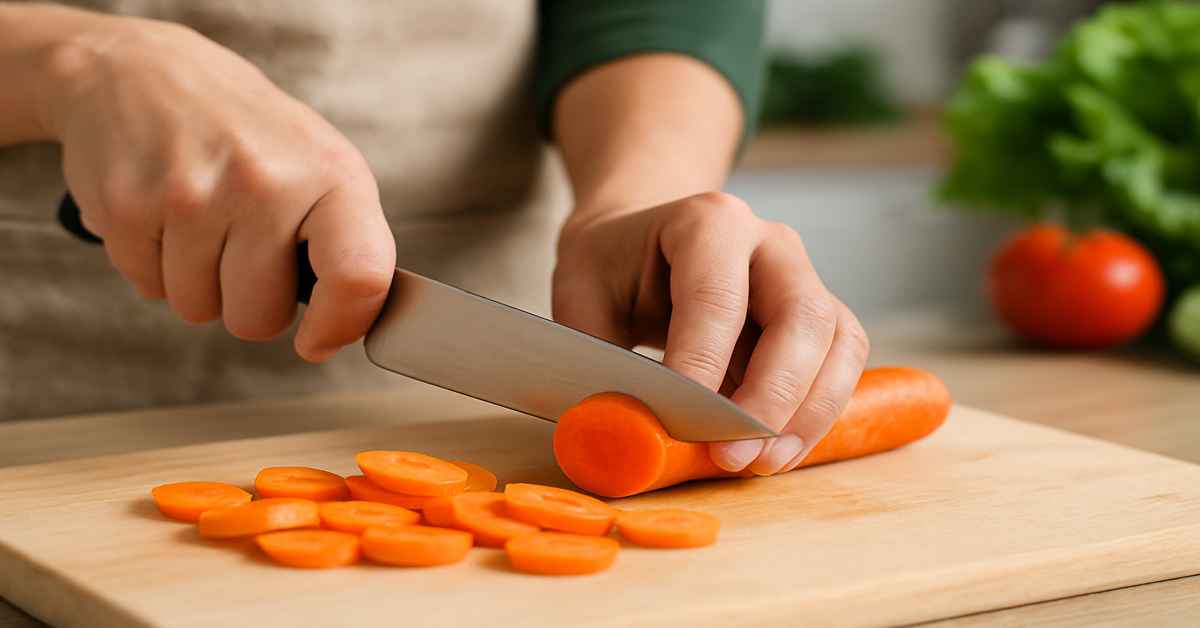Learning to cook is one of the most rewarding and empowering life skills anyone can acquire.
Whether you’re preparing meals for yourself, friends, or family, understanding basic cooking techniques gives you control over your nutrition, health, and budget.
For beginner cooks, the journey can seem overwhelming. However, by focusing on a core set of foundational skills, you’ll build confidence and competence in the kitchen faster than you think.
This article explores the top 20 essential cooking skills every beginner should master to create delicious, balanced meals with ease and efficiency.
Top 20 Cooking Skills Every Beginner Should Master
We’ve put together a list of 20 key skills that every beginner cook should know to gain confidence in the kitchen
1. Knife Skills
Mastering basic knife techniques like chopping, dicing, mincing, and slicing improves your efficiency and safety.
Learn how to properly hold a chef’s knife and practice cutting vegetables uniformly.
2. How to Boil and Simmer
Understanding the difference between boiling and simmering is key for recipes like pasta, rice, soups, and stews. Boiling occurs at a rapid bubble, while simmering is gentler and used for slow cooking.
3. Cooking Pasta Perfectly
Cooking pasta al dente is essential. Learn the ideal water-to-pasta ratio, when to salt the water, and why you should never rinse cooked pasta.
4. Sautéing Vegetables
Sautéing is a quick-cook method using a small amount of oil over medium-high heat.
It preserves color, flavor, and nutrients in vegetables. Avoid overcrowding the pan to get even cooking.
5. Basic Food Safety and Hygiene
Understanding how to handle raw meat, wash produce, and avoid cross-contamination helps prevent foodborne illnesses.
Always wash your hands and sanitize surfaces after handling raw ingredients.
6. Reading and Following a Recipe
Following a recipe correctly includes understanding ingredient measurements, cooking terms, and the sequence of steps.
Prepping your ingredients ahead of time (mise en place) makes this easier.
7. Seasoning and Flavor Balancing
Salt enhances flavor, while herbs, spices, and acids like lemon juice or vinegar balance dishes.
Learn to taste as you cook and adjust accordingly.
8. Cooking Rice and Grains
Each grain requires a different water-to-grain ratio and cooking time.
Mastering rice, quinoa, and couscous provides a versatile foundation for many meals.
9. Baking Basics
Understand the science behind baking, including proper measuring, preheating the oven, and not overmixing batter.
Start with simple recipes like muffins or cookies.
10. Making Simple Sauces
Learn how to make basic sauces like tomato sauce, white sauce (béchamel), or gravy.
Sauces elevate the flavor and texture of meals and can transform basic dishes.
11. Using Kitchen Tools Properly
Knowing how to safely and effectively use kitchen tools—like peelers, graters, thermometers, and mixers—enhances your cooking process and prevents accidents.
12. Cooking Eggs in Different Ways
Eggs are incredibly versatile. Master boiling, scrambling, frying, and poaching.
Each method requires different temperatures and timing for best results.
13. Stir-Frying
Stir-frying is a high-heat cooking technique often used in Asian cuisine.
It requires constant stirring, quick cooking, and prepped ingredients.
14. Roasting Vegetables and Meats
Roasting brings out deep, rich flavors.
Understand oven temperatures, seasoning, and timing. Use a meat thermometer to ensure proteins are cooked safely.
15. Making Salads and Dressings
Learn to create balanced salads with a mix of textures, colors, and nutrients.
Make your own vinaigrettes or creamy dressings for healthier, tastier salads.
16. Budgeting and Meal Planning
A key skill for home cooks is learning how to plan meals for the week, use leftovers creatively, and shop efficiently.
This reduces food waste and saves money.
17. Toasting Spices and Nuts
Toasting brings out the essential oils and enhances flavor.
Learn to toast on a dry skillet or in the oven without burning.
18. Broiling Basics
Broiling uses direct, high heat from above.
It’s perfect for melting cheese, crisping breadcrumbs, or giving meats a quick char.
19. Cooking Proteins (Chicken, Fish, Beef)
Learn basic techniques like pan-searing, baking, or grilling. Understand doneness indicators (like clear juices for chicken or flake texture for fish).
20. Cleaning As You Cook
Keeping your workstation clean makes cooking smoother and safer.
Wash utensils and cutting boards immediately after use and wipe spills promptly.
Conclusion
Cooking doesn’t have to be intimidating. With these 20 foundational skills, beginner cooks can build a strong kitchen foundation that will serve them for years.
Practice, patience, and a willingness to learn from mistakes are key to improvement.
Whether you’re aiming to eat healthier, save money, or impress your loved ones, mastering these skills will put you well on your way to becoming a confident home chef.









